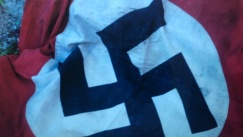
Who can imagine their own death?
We’ve just been interviewing a variety of veterans for the site, and I’ve been struck again by the fundamental problem I have faced in the last 20 years of research into this subject.
Not the difficulty of convincing former Nazis to talk, or the time consuming task of checking that interviewees are actually who they say they are. Difficult as those tasks can be, they are all surmountable. But there’s a much bigger conceptual challenge that lurks behind all of this. Which is that we cannot interview the dead.
Yes, I know that’s a truism. But it represents a tremendous barrier to our understanding of the experience of war. I’ve met and interviewed, for example, survivors from the Nazi extermination centres of Auschwitz, Sobibor and Treblinka. But I have never met an individual sent to any of those camps who had the ‘normal’ and ‘average’ experience – because the majority of people the Nazis sent to those camps were murdered. What that means is that we are denied a personal insight into what, in a way, is the fundamental horror the Nazis created – the last moments in the gas chamber. We also, and this worries me more, can sometimes create an impression, by interviewing survivors, that if the viewers were to be in a similar situation then they too would survive – when they almost certainly wouldn’t.
This problem is compounded by the inability of human beings to imagine their own death. Almost every soldier I have met who fought in the war has told me that they never really believed that they would die. It was always, they thought, going to be someone else in their unit who never come back. As Ernest Becker, quoting Aristotle, put it: ‘luck is when the guy next to you gets hit with the arrow’. And this fundamental self-centeredness seems hard wired into the brains of almost everyone. A friend of mine, for example, was recently at his sick brother’s bedside as he was about to be operated on for a tumor. ‘What did you feel,’ I asked him, ‘when you saw your brother lying there?’
‘Honestly?’ he replied. ‘I felt – I’m really glad it’s not me with the tumor.’
Tom Wolfe also wrote insightfully about this phenomenon in this book ‘The Right Stuff’. He revealed that American test pilots would explain away the death of one of their comrades by thinking that the dead pilot must have made a mistake. They, by implication, would never make that error and so were indestructible.
It’s for all these reasons that I believe that one of the single greatest historical books every written is called ‘Amidst a nightmare of crime’ published by the Auschwitz state museum. It’s a collection of fragments written by prisoners at Auschwitz who were forced to work in the Crematoria/gas chambers at the camp on pain of their own immediate death. They were made to do the horrendous work of cleaning the gas chambers and burning the bodies – all with the knowledge that they too would eventually suffer the same fate. Yet some of them still managed to scribble their thoughts on pieces of paper and hide them in the ground, hoping that one day their last words would be recovered. It’s this material that constitutes ‘Amidst a nightmare of crime’.
Take the testimony of Chaim Hermann, for example. His thoughts were of his wife, and he was moved to write to her, saying: ‘If there have been, at various times, trifling misunderstandings in our life, now I see how one was unable to value the passing time.’ His last entry is one of the most poignant testimonies I have ever read: ‘I am taking this opportunity of assuring you that I am leaving calmly and perhaps heroically (this will depend on circumstances).’
But nobody survived those last minutes of Chaim Hermann’s life, in Auschwitz in the autumn of 1944, to tell us whether he was able to die as heroically as he wished. And, of course, he is someone we can never meet to ask.
 Twitter
Twitter





